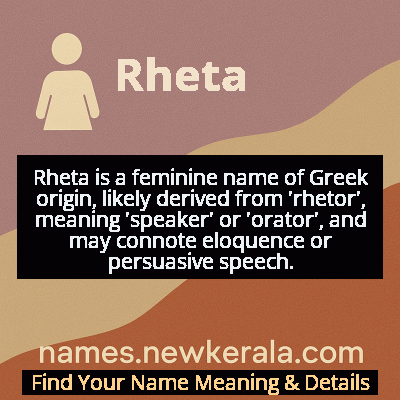Rheta Name Meaning & Details
Origin, Popularity, Numerology Analysis & Name Meaning of Rheta
Discover the origin, meaning, and cultural significance of the name RHETA. Delve into its historical roots and explore the lasting impact it has had on communities and traditions.
Name
Rheta
Gender
Female
Origin
Greek
Lucky Number
7
Meaning of the Name - Rheta
Rheta is a feminine name of Greek origin, likely derived from 'rhetor', meaning 'speaker' or 'orator', and may connote eloquence or persuasive speech.
Rheta - Complete Numerology Analysis
Your Numerology Number
Based on Pythagorean Numerology System
Ruling Planet
Neptune (Ketu)
Positive Nature
Intuitive, analytical, spiritual, and inquisitive.
Negative Traits
Secretive, reserved, aloof, and can be overly critical.
Lucky Colours
Green, yellow.
Lucky Days
Monday.
Lucky Stones
Cat’s eye, moonstone.
Harmony Numbers
1, 5, 6.
Best Suited Professions
Scientists, researchers, spiritual leaders, detectives.
What People Like About You
Depth of knowledge, analytical skills, spirituality.
Famous People Named Rheta
Rheta Childe Dorr
Journalist and Suffragist
First female editor of the New York Evening Post and prominent women's rights activist
Rheta Grimsley Johnson
Journalist and Columnist
Nationally syndicated columnist and author known for her Southern perspective
Rheta West
Educator and Administrator
Pioneering educator who served as president of the National Education Association
Name Variations & International Equivalents
Click on blue names to explore their detailed meanings. Gray names with will be available soon.
Cultural & Historical Significance
Extended Personality Analysis
People named Rheta typically exhibit a distinctive blend of intellectual depth and social grace that makes them natural communicators and leaders. Their innate ability to articulate thoughts clearly often positions them as mediators and educators in their social circles. Rhetas tend to be lifelong learners with broad intellectual interests, from literature and philosophy to social sciences. They approach conversations with both empathy and analytical rigor, making them excellent at understanding multiple perspectives while maintaining their own reasoned positions. This balance of emotional intelligence and logical thinking allows them to build consensus and inspire action. While they can be persuasive, Rhetas generally use this ability responsibly, preferring to educate rather than manipulate. Their communication style is often characterized by clarity, warmth, and thoughtful consideration, making them trusted advisors and valued friends. These individuals typically have strong moral compasses and use their verbal gifts to advocate for causes they believe in, whether in professional settings or personal relationships.
Modern Usage & Popularity
In contemporary naming practices, Rheta occupies a unique position as a rare classical name with strong intellectual and feminist associations. While it has never reached mainstream popularity, it maintains a consistent presence among parents seeking distinctive names with historical depth and meaningful origins. Current usage trends show it's particularly favored by academic families, writers, and those with Greek heritage who appreciate its classical roots. The name has seen a modest increase in usage since 2010 as part of the vintage name revival movement, though it remains outside the top 1000 names in the United States. Its rarity contributes to its appeal for parents wanting a name that stands out without being overly unconventional. Modern Rhetas often find their name opens conversations about its meaning and history, creating natural opportunities to discuss classical education and women's intellectual traditions. The name's sophisticated sound and meaningful background make it a compelling choice for parents valuing both aesthetic appeal and substantive meaning.
Symbolic & Spiritual Meanings
Symbolically, Rheta represents the transformative power of articulate expression and the bridge between private thought and public influence. The name embodies the ancient Greek ideal of logos—the principle of reasoned discourse that orders the cosmos and human society. Metaphorically, it suggests a person who can give form to abstract ideas and make wisdom accessible through clear communication. In symbolic terms, Rheta connects to the mythological figure of Athena, goddess of wisdom and strategic communication, representing the combination of intelligence and practical effectiveness. The name also carries connotations of authenticity and integrity in speech, reflecting the philosophical ideal that true eloquence must serve truth and virtue. Symbolically, Rheta represents the idea that well-chosen words can create understanding, build community, and drive positive change. It suggests a person who serves as a conduit for important ideas and a catalyst for collective wisdom, making the name particularly meaningful in our information-rich but often communication-poor modern world.

